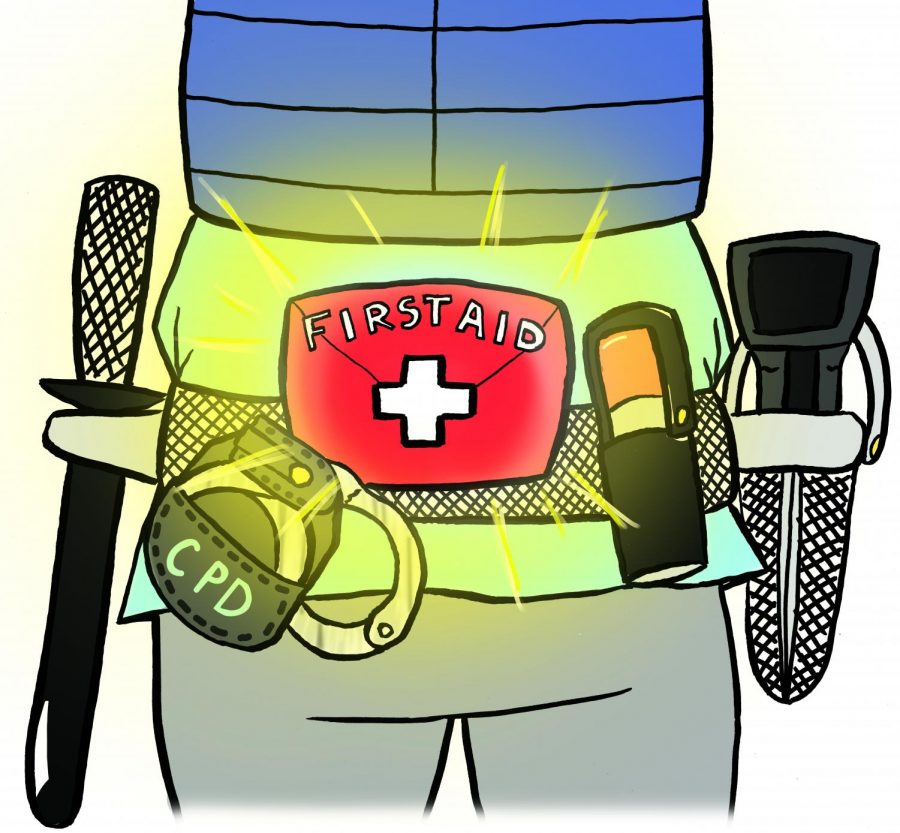Chicago police supplied with life-saving equipment
Chicago police supplied with life-saving equipment
October 31, 2016
Four hundred state-of-the-art first-aid kits were delivered to the Chicago Police Academy so specially-trained officers can administer “rapid, on-site aid” for people suffering from serious injuries, according to an Oct. 21 press release.
Mary Ann Rose the executive director of the Chicago Police Foundation, the nonprofit organization that supplied the kits, said local police officers usually purchase first-aid kits out of pocket because they are not in CPD’s budget. She added that she was “shocked” when she discovered that information.
CPF, which funds supplemental resources and equipment for Chicago’s officers, is planning to donate 2,000 kits to CPD over the next four years, according to the press release. Police officers who go through the CPD’s Law Enforcement Medical and Rescue Training—a lecture, hands-on and reality simulation course in first aid techniques—will receive the kits.
Waldemar Cruz, president of the Puerto Rican Police Association, an organization that brings together law enforcement officers of Puerto Rican descent, said supplying police officers with first-aid kits and training has become more common nationally.
“It is important to have the tools to help fellow officers and civilians to ensure safety,” Cruz said.
According to CPF, the kits contain a tourniquet, combat gauze, a compact chest seal, trauma shears, an emergency survival blanket, duct tape, a CPR mask and a pair of talon nitrile gloves.
Rose said these kits are essential because police officers are often the first responders to life threatening injuries and too often lack the proper tools and training to save lives. Rose referred to CPD Superintendent Eddie Johnson’s story he told when CPF delivered the kits. Johnson said he lost three friends to gunshot wounds and that these first-aid kits could have saved their lives.
Robert Lombardo, professor of criminal justice at Loyola University Chicago, said the new equipment and training would benefit both citizens and police officers because time is essential in life-threatening situations.
“The fire department has fairly good response time with properly trained people, but minutes count,” Lombardo said.
Rose said CPF has only been in existence for two years, and was created after she discovered Chicago was the only major city without a police foundation. She added that the private sector needs to “step up” in order to provide the police with adequate equipment to perform their job.
All new officers who graduate from the city’s police academy will be trained in the CPD rescue training program, according to Rose.
“That is why we are presenting these [first-aid kits] to new recruits [as opposed to veterans],” Rose said.
Currently, police officers in Illinois receive basic first-aid training, according to Cruz. He said other police departments should implement the first-aid training.
A Chicago police officer from 1969–1998, Lombardo said the first-aid kits and the training would put an additional responsibility on police officers, and potential liabilities need to be taken into consideration by CPD.
Cruz, however, said citizens already hold officers to a high standard, and the additional coaching and equipment will only help them achieve them.
“Having a first-aid kit gives us another tool to complete that mission,” Cruz said.








